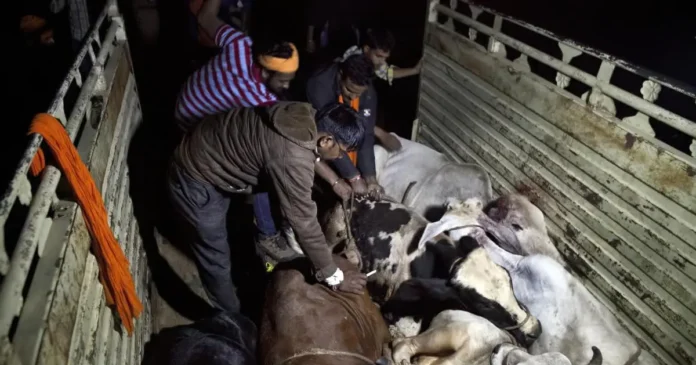Animal Cruelty Raebareli incident has sent shockwaves across India as a video surfaced showing a man brutally assaulting a tied bovine in Mohanganj village. This appalling act, captured on camera, highlights the grim reality of animal cruelty in the country. The video has drawn widespread outrage and prompted swift action from Raebareli Police.
Details Of The Shocking Incident
The disturbing footage shows the man repeatedly hitting a tied bovine near a wall, eliciting helpless cries from the animal. Witnesses claim the act was unprovoked, and the attacker showed no remorse during the incident.
The brutal act reportedly took place under the jurisdiction of Salon Police Station. After the video went viral on social media, public outrage forced authorities to intervene. The Inspector-in-Charge of Salon Police Station was instructed to investigate the matter and take strict action against the accused.
India’s Rising Cases Of Animal Cruelty
Incidents like the Animal Cruelty Raebareli case are not isolated. According to a report by the Federation of Indian Animal Protection Organisations (FIAPO), India witnesses thousands of cases of animal cruelty every year. From street animals to domestic pets and livestock, no category is spared from abuse.
Despite the existence of laws like the Prevention of Cruelty to Animals Act, 1960, enforcement remains weak. Activists argue that penalties under this Act, which often include fines as low as ₹50, fail to deter perpetrators.
Legal Framework And Its Shortcomings
The Prevention of Cruelty to Animals Act is India’s primary legislation against animal abuse. However, experts have long criticized its outdated provisions. While it prohibits acts of cruelty, including beating, overloading, or neglecting animals, the lack of stringent penalties has rendered the law ineffective.
In response to public demand, the government has proposed amendments to the Act, aiming to increase penalties and include provisions for repeat offenders. The Animal Cruelty Raebareli case could further fuel discussions around these much-needed reforms.
Social Media’s Role In Highlighting Abuse
The rise of social media has played a pivotal role in bringing incidents like this to light. Platforms like Twitter and Facebook have become avenues for sharing evidence of abuse, often leading to public outrage and action from authorities.
In the Animal Cruelty Raebareli case, it was the viral video that drew attention to the heinous act. Activists argue that public vigilance and digital platforms are critical tools for combating animal abuse, particularly in regions where local authorities may overlook such incidents.
Cultural And Ethical Implications
Animal cruelty is not just a legal issue but also a cultural and ethical one. India, known for its diverse traditions, often reveres animals in religious and cultural contexts. For instance, cows are considered sacred in Hinduism, making acts of violence against them particularly egregious.
However, activists note that reverence alone is not enough. Awareness campaigns and education are essential to foster a culture that respects and protects all animals, regardless of their utility or symbolic value.
Steps Taken By Authorities
In response to the Animal Cruelty Raebareli video, Raebareli Police have promised a thorough investigation. They have urged the public to report any additional evidence or witnesses to strengthen the case against the accused.
This incident also underscores the need for local authorities to prioritize animal welfare. Activists have called for the establishment of special animal protection units within police departments to address such cases more effectively.
Public Response And Activism
The video has ignited a wave of public anger, with citizens demanding stricter action against the perpetrator. Online petitions and social media campaigns have called for harsher penalties for animal cruelty cases, reflecting growing awareness and activism among the public.
Organizations like People for Animals (PFA) and Humane Society International (HSI) have stepped in, offering legal assistance and support to ensure justice for the bovine.
Looking Ahead: The Need For Change
The Animal Cruelty Raebareli incident is a grim reminder of the urgent need for systemic changes in India’s approach to animal welfare. From amending outdated laws to increasing public awareness and ensuring stricter enforcement, a multi-pronged strategy is essential.
While this case has brought attention to the plight of animals, sustained efforts are required to create a society where such acts are not just condemned but prevented. Advocacy, education, and legal reforms must work in tandem to ensure the safety and dignity of all animals in India.



